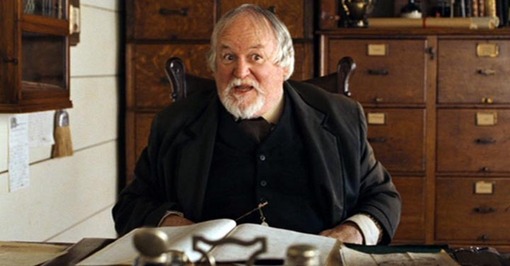I’ve expressed my admiration for Carter Burwell’s Mahleresque orchestrations of American hymns and folk tunes in his score for “True Grit” (2010). Watching the first part of the movie again, it struck me that the movie itself is a sort of cantata for tenor, baritone and bass voices. Certainly Charles Portis’s language (which sounds like Coen dialog, after all), and the way it’s delivered — the tempi, rests, rhythms — are decidedly musical, as the lyrics always are in Coen movies.
Evidently, that’s one reason they wanted to make the movie — and if you compare some of the very same lines in the 1969 film with the 2010 film, you’ll immediately hear the difference between speaking and singing. Henry Hathaway tried to make the words sound as conversational as possible; the Coens go for Baroque — high stylization that’s not quite horse-operatic, but in an American vernacular that’s like Bach transposed to “Deadwood.”
Mattie (Hailee Steinfeld) may be the youthful contralto soloist (despite her age, she’s no soprano!), but she’s surrounded by male voices in the lower registers (which helps to make Josh Brolin’s countertenor Tom Chaney all the weirder and funnier). Near the top of the film there’s a series of duets, particularly musical in character, beginning with Mattie’s post-hanging interrogation of the sheriff, her first encounter with Rooster Cogburn (Jeff Bridges, in outhouse for additional resonance), and her negotiation with Colonel Stonehill. The film’s deep-vocal culmination, perhaps, is an an off-stage solo by JK Simmons as Mattie’s lawyer, J. Noble Daggett (definitely a bass).
Just another example of the many ways the Coens’ movies are as much fun to listen to as they are to watch.











